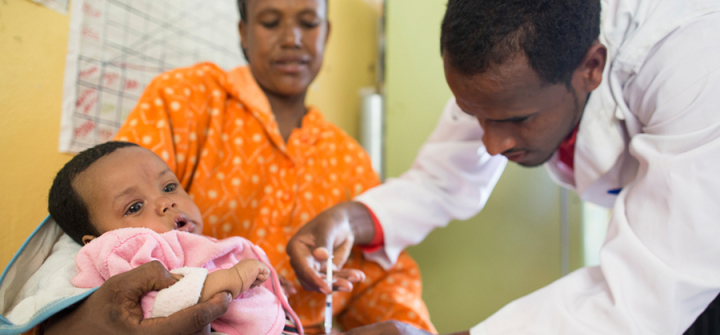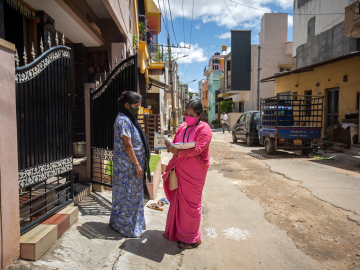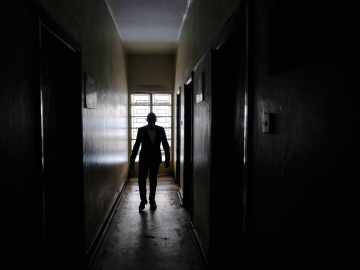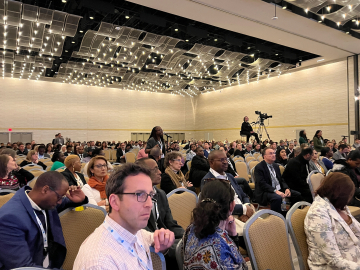It’s Time to Take the Air Out of Pneumonia
There is something that you and I both do 23,000 times each day.
Breathe. Inhale life-sustaining oxygen, without which we’d only survive a handful of minutes. Breathing shouldn’t be a privilege. But it is. Around the world, pneumonia makes breathing impossible for too many, taking the lives of 920,000 children annually—a life every 2 minutes. That’s more than malaria and diarrhea combined.
When I first began my career, children dying from pneumonia seemed unavoidable. A pneumonia vaccine was not yet available and antibiotics were expensive and hard to access. This left kids vulnerable to disease, like those I treated in South Africa as a medical student. Every day, I listened to the crackling chests of young children as they fought for air.
Now, 25 years later, pneumonia is not only curable, but largely preventable. With the help of Gavi, more than 109 million kids in developing countries have been vaccinated with pneumococcal conjugate vaccine (PCV), which protects them against the leading cause of pneumonia deaths. Antibiotics are cheaper and more widely available. And even life-sustaining oxygen therapy is becoming more readily available, thanks to the WHO’s recent decision to list oxygen on the Essential Medicines List.
Yet, overall progress remains intolerably slow compared to other childhood diseases. While pneumonia deaths have dropped by nearly 50% since 2000, too many kids still don’t have access to vaccines that can prevent the disease from taking hold in the first place. Approximately 1/2 of the world’s children are still not receiving PCV. This leaves kids immediately vulnerable, and in the longer-term impacts the effectiveness of antibiotics as more childhood infections results in increased antibiotic use.
While I think about these concerns often, around World Pneumonia Day on November 12 (which happens to fall during World Antibiotic Awareness week) I pause to consider how far we have come, and how we can move forward so no child dies a preventable death from pneumonia.
Most urgently, PCV must become more affordable so it can reach every child who needs it. Tremendous financial investment in Gavi, the Vaccine Alliance, in the last decade has enabled PCV to be priced at $9 per child, so it can begin to reach children in the poorest countries in the world. But, we believe that to reach every child, pharmaceutical companies, governments and aid donors should commit to getting this cost below $5.
Additionally, when kids do fall ill, governments must ensure that oxygen therapy and antibiotics are readily available. We must continue to build awareness about pneumonia, its symptoms and its treatments. Thanks to Save the Children’s recent “Fighting for Breath” report, there is a clear path forward to focus efforts to saving more than 5 million lives from pneumonia by 2030.
Especially with emerging antibiotic resistance, tackling pneumonia is an urgent priority. I am inspired by the work that’s been done and remain steadfast that with renewed commitment, we will finally take the air out of a disease that has stolen the breath of far too many.
Keith Klugman, MD, PhD, is the Director of Pneumonia at the Bill & Melinda Gates Foundation. He is a leading expert on antibiotic resistance in pneumonia pathogens and helped develop the pneumococcal vaccine. Prior to working at the foundation, Keith was the William H. Foege Professor of Global Health and Professor of Epidemiology in the Rollins School of Public Health at Emory University, as well as Professor of Medicine in the Division of Infectious Diseases at the Emory School of Medicine.
Join the thousands of subscribers who rely on Global Health NOW summaries and exclusive articles for the latest public health news. Sign up for our free weekday enewsletter, and please share the link with friends and colleagues: http://www.globalhealthnow.org/subscribe.html
Mifta Mohammed gives a PCV vaccine to 5-month-old Tesfahun Tekilo as her mother Aberash Girm holds him at Dalocha Health Center in Kebet, Ethiopia. March 28, 2013. ©Bill & Melinda Gates Foundation/Jiro




